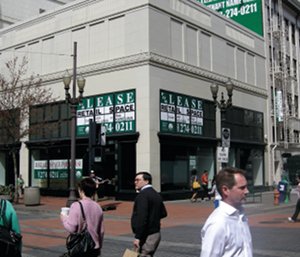 It was the 25th anniversary of Pioneer Courthouse Square. The early April weather was brilliant, the cake was free, and the center was humming with visitors and workers soaking up sun and ambience.
It was the 25th anniversary of Pioneer Courthouse Square. The early April weather was brilliant, the cake was free, and the center was humming with visitors and workers soaking up sun and ambience.
Portland’s downtown has been losing key stores. |
PORTLAND It was the 25th anniversary of Pioneer Courthouse Square. The early April weather was brilliant, the cake was free, and the center was humming with visitors and workers soaking up sun and ambience. Shoppers were filing into the Nordstrom store across the street. The line inside Starbucks ran 10 people deep. One block away, the sidewalk tables in front of Elephants Deli were packed with people enjoying the gritty construction of the coming Park Avenue West skyscraper.
But the for-lease signs are creeping. Among the recent casualties in the heart of Portland are See’s Candies on SW Morrison, the City Arts shop on SW Yamhill, the Shoe Pavilion on SW Fourth, the Three Lions Bakery on SW Sixth, and Portland Cutlery Co., which sold knives on SW Broadway for more than a century. Add to that list the disconcerting recent news that Zell Bros. Jewelers, an upscale shopping destination since 1912 and the presumed anchor tenant of the remodeled Pacific First Center, is unlikely to survive the downturn, and you’ve got a problem. Especially when you factor in the construction delay at Park Avenue West.
According to a recent report by Norris, Beggs & Simpson, the overall retail vacancy rate for metropolitan Portland is a relatively strong 6.5%. But the central city, one of seven submarkets within greater Portland, has the highest vacancy rate at 8.2%. For all of Portland’s self-congratulatory claims of having defeated the sprawl beast, 2008 retail sales at suburban Washington Square topped those in all of downtown by $180 million.
These downward trends lend new urgency to an effort by 30 business leaders selected by Mayor Sam Adams to hone a downtown retail strategy based on success stories from Pasadena, Calif., Vancouver, B.C., and Boston. David Leland, a Portland-based retail strategist who has been in the business for more than 40 years, recommends recruiting urban versions of big-box stores such as Target, improving the atmosphere along SW 10th, encouraging still more residential density, turning Broadway into a two-way street, providing more street parking and creating new financing options.
Leland has consulted with more than 80 city governments about their downtowns over his career, and he remains optimistic about Portland’s position. But he predicts more stores will close before the next wave of grand openings, and he warns, “Complacency is a great danger.”

